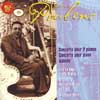Poulenc Piano Concerto; Concerto for 2 Pianos; Aubade
Splendid piano playing but does the acoustic hinder Poulenc’s sparkle?
View record and artist detailsRecord and Artist Details
Composer or Director: Francis Poulenc
Genre:
Orchestral
Label: Red Seal
Magazine Review Date: 1/2005
Media Format: CD or Download
Media Runtime: 80
Mastering:
Stereo
DDD
Catalogue Number: 82876 60308-2

Tracks:
| Composition | Artist Credit |
|---|---|
| Concerto for Two Pianos and Orchestra |
Francis Poulenc, Composer
Eric Le Sage, Piano Francis Poulenc, Composer Frank Braley, Piano Liège Philharmonic Orchestra Stéphane Denève, Conductor |
| Concerto for Piano and Orchestra |
Francis Poulenc, Composer
Eric Le Sage, Piano Francis Poulenc, Composer Liège Philharmonic Orchestra Stéphane Denève, Conductor |
| Aubade |
Francis Poulenc, Composer
Eric Le Sage, Piano Francis Poulenc, Composer Liège Philharmonic Orchestra Stéphane Denève, Conductor |
Author: rnichols
Dismissive as Poulenc was of much of his solo piano music, he seems to have been reasonably happy with his three works for piano and orchestra, and indeed was decidedly grumpy when the audience at the Boston première of the Piano Concerto in 1950 showed ‘more sympathy than real enthusiasm’ – and that after he’d put in a quotation from Swanee River specially for them. He comforted himself with the thought that their reaction came from listening to too much Sibelius.
All three works show Poulenc’s Parisian wit at its sparkling best, but also much else. And here lies a problem. The Philharmonic Hall in Liège has a generous echo, ideal for warm, romantic moments like the opening of the Piano Concerto’s slow movement, but less suitable for the manic repeated notes in the finale of the Double Concerto (we also lose out on the hysterical edge to the sound at the start of the Aubade, which sets the scene for this deeply uncomfortable work). Not that Poulenc solved the problem in either of his recordings of the concerto with Jacques Février: in his 1958 version conducted by Pierre Dervaux (HMV, 3/61 – nla) the piano sound is clean but rather thin, while the 1965 one with Georges Prêtre comes closer to the disc under review.
Of the performances themselves I have little but praise. Both Eric Le Sage and Frank Braley have the fingers for this often very taxing music and their ensemble in the Double Concerto is impeccable. Maybe their playing of the strange gamelan passage at the end of the first movement doesn’t have quite the magic of Poulenc/Février (even more magical in the Prêtre version), but otherwise they are spirited and soulful where required. Le Sage is in absolute control throughout the Piano Concerto and only in the fiendish opening Toccata of Aubade does he accelerate through anxiety. The orchestral playing is excellent, with some lovely woodwind solos. And if you can accept the resonant, slightly plummy acoustic, then this disc will give much pleasure.
All three works show Poulenc’s Parisian wit at its sparkling best, but also much else. And here lies a problem. The Philharmonic Hall in Liège has a generous echo, ideal for warm, romantic moments like the opening of the Piano Concerto’s slow movement, but less suitable for the manic repeated notes in the finale of the Double Concerto (we also lose out on the hysterical edge to the sound at the start of the Aubade, which sets the scene for this deeply uncomfortable work). Not that Poulenc solved the problem in either of his recordings of the concerto with Jacques Février: in his 1958 version conducted by Pierre Dervaux (HMV, 3/61 – nla) the piano sound is clean but rather thin, while the 1965 one with Georges Prêtre comes closer to the disc under review.
Of the performances themselves I have little but praise. Both Eric Le Sage and Frank Braley have the fingers for this often very taxing music and their ensemble in the Double Concerto is impeccable. Maybe their playing of the strange gamelan passage at the end of the first movement doesn’t have quite the magic of Poulenc/Février (even more magical in the Prêtre version), but otherwise they are spirited and soulful where required. Le Sage is in absolute control throughout the Piano Concerto and only in the fiendish opening Toccata of Aubade does he accelerate through anxiety. The orchestral playing is excellent, with some lovely woodwind solos. And if you can accept the resonant, slightly plummy acoustic, then this disc will give much pleasure.
Discover the world's largest classical music catalogue with Presto Music.

Gramophone Digital Club
- Digital Edition
- Digital Archive
- Reviews Database
- Full website access
From £8.75 / month
Subscribe
Gramophone Full Club
- Print Edition
- Digital Edition
- Digital Archive
- Reviews Database
- Full website access
From £11.00 / month
Subscribe
If you are a library, university or other organisation that would be interested in an institutional subscription to Gramophone please click here for further information.




